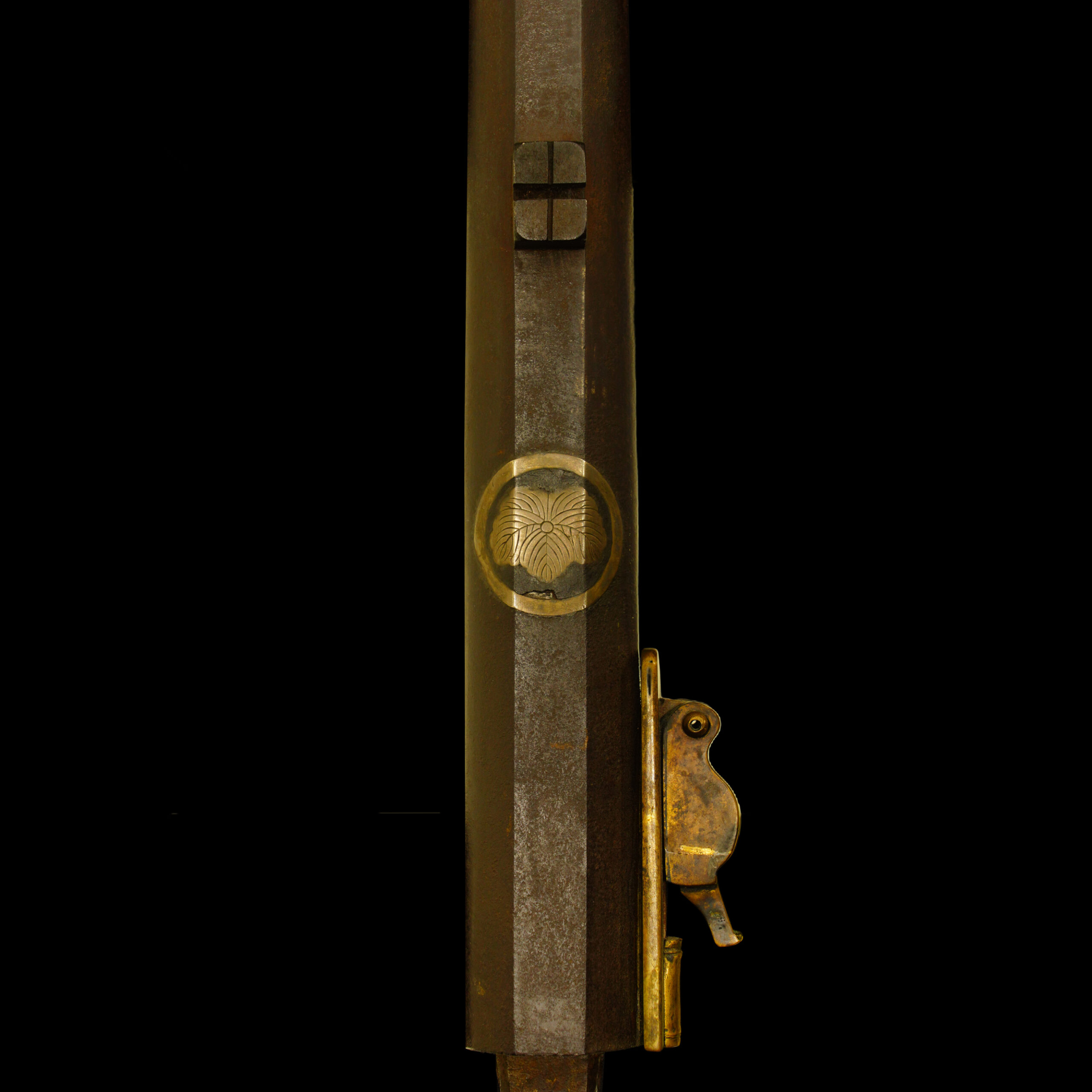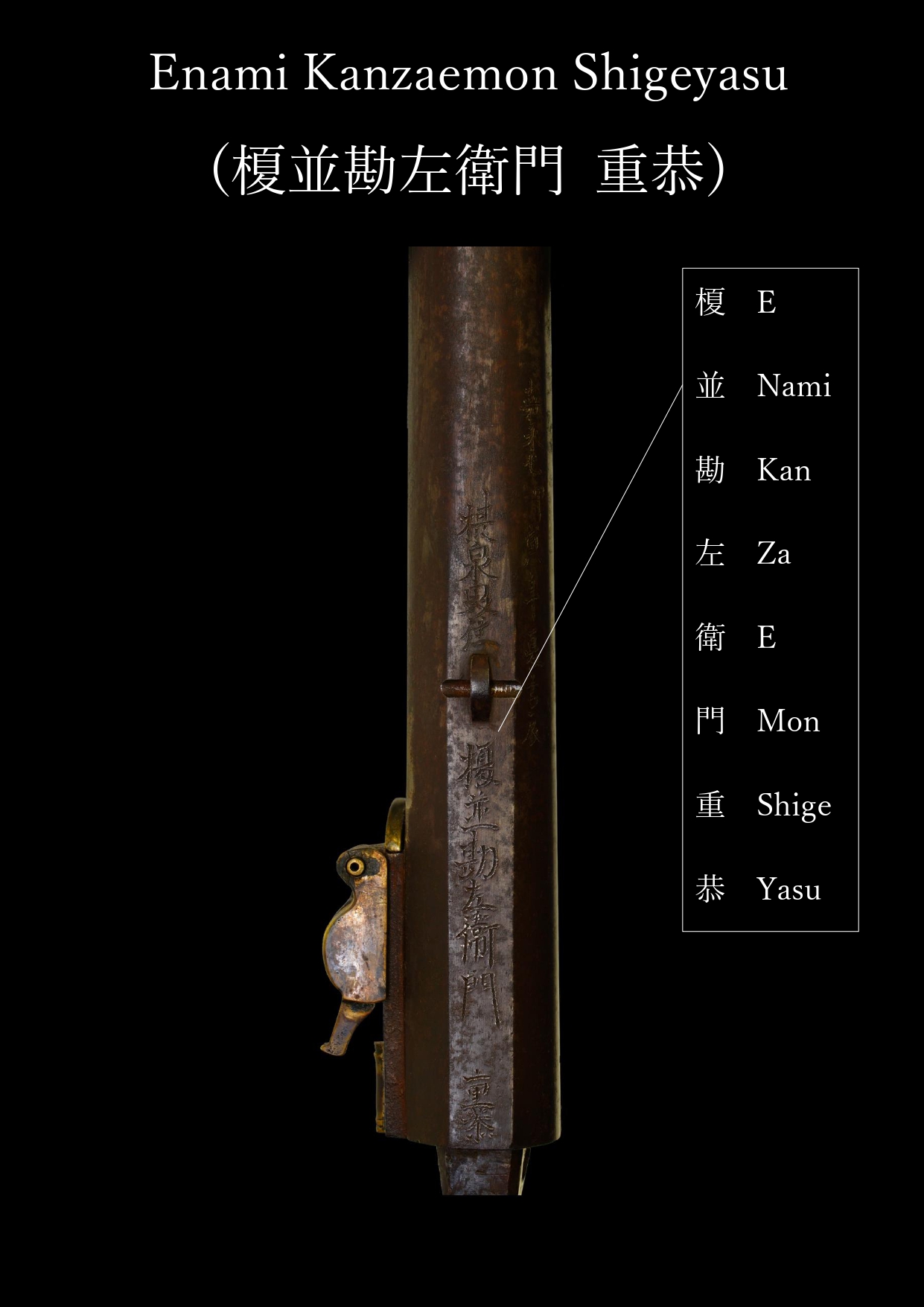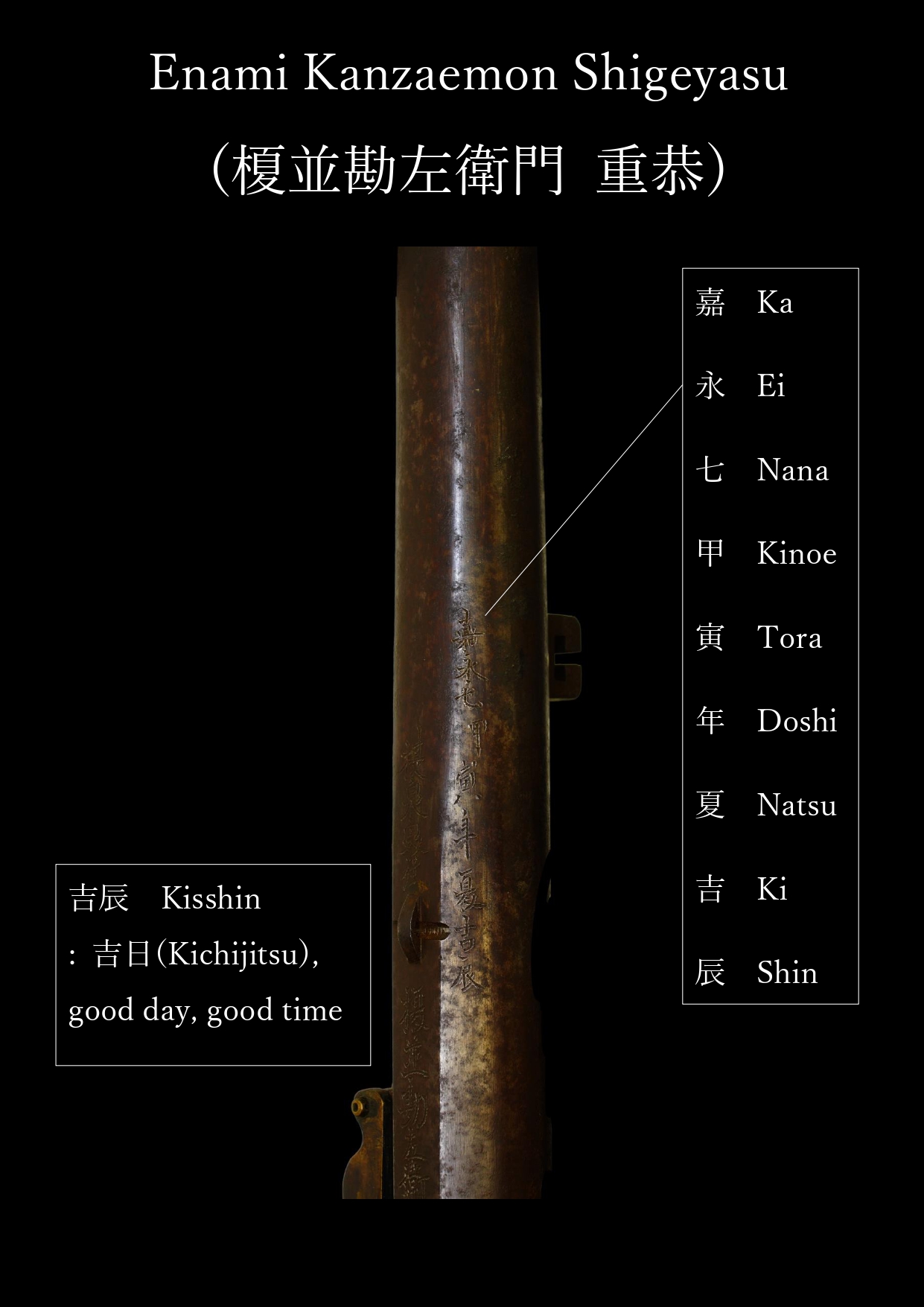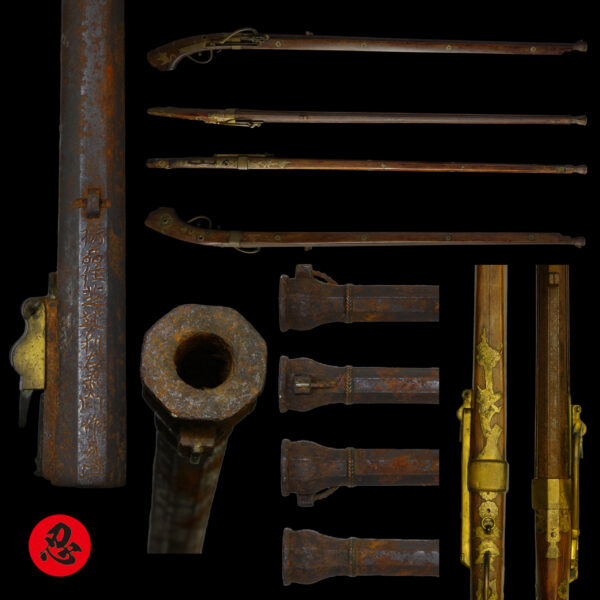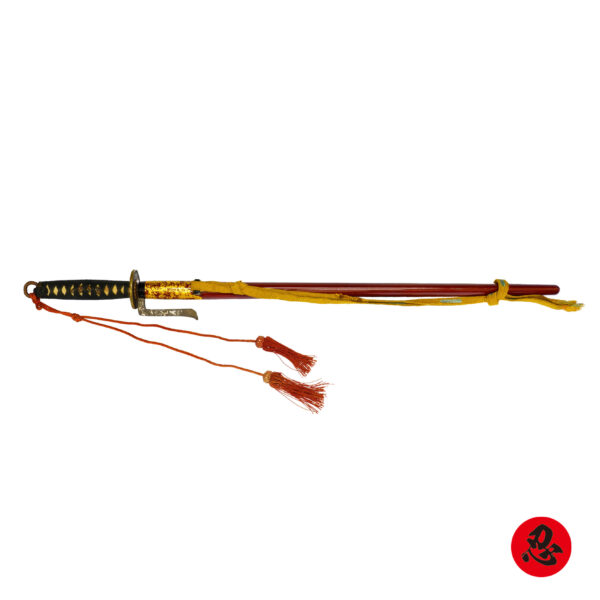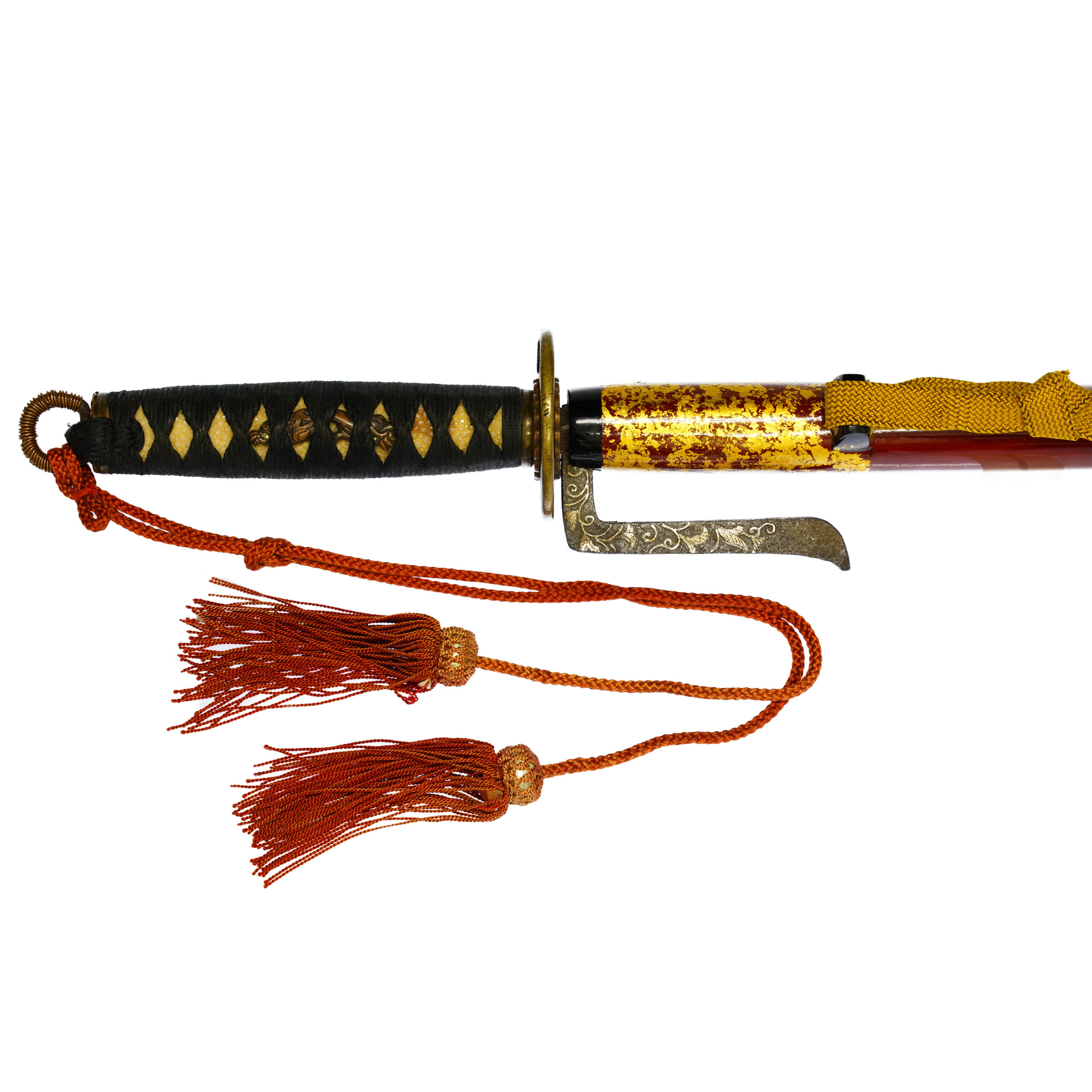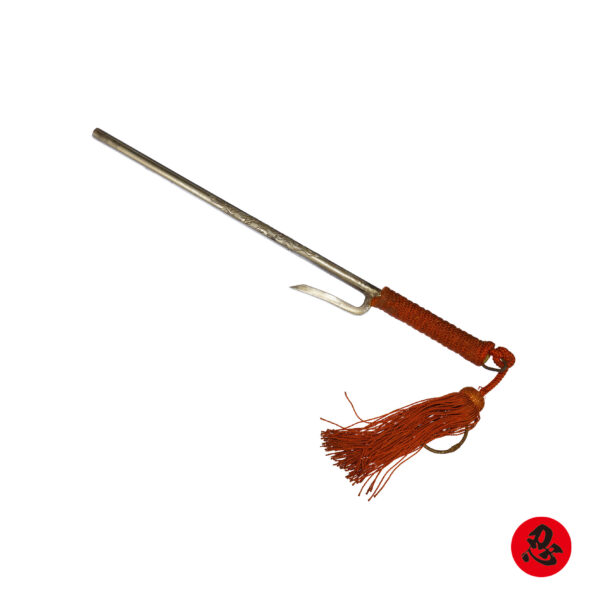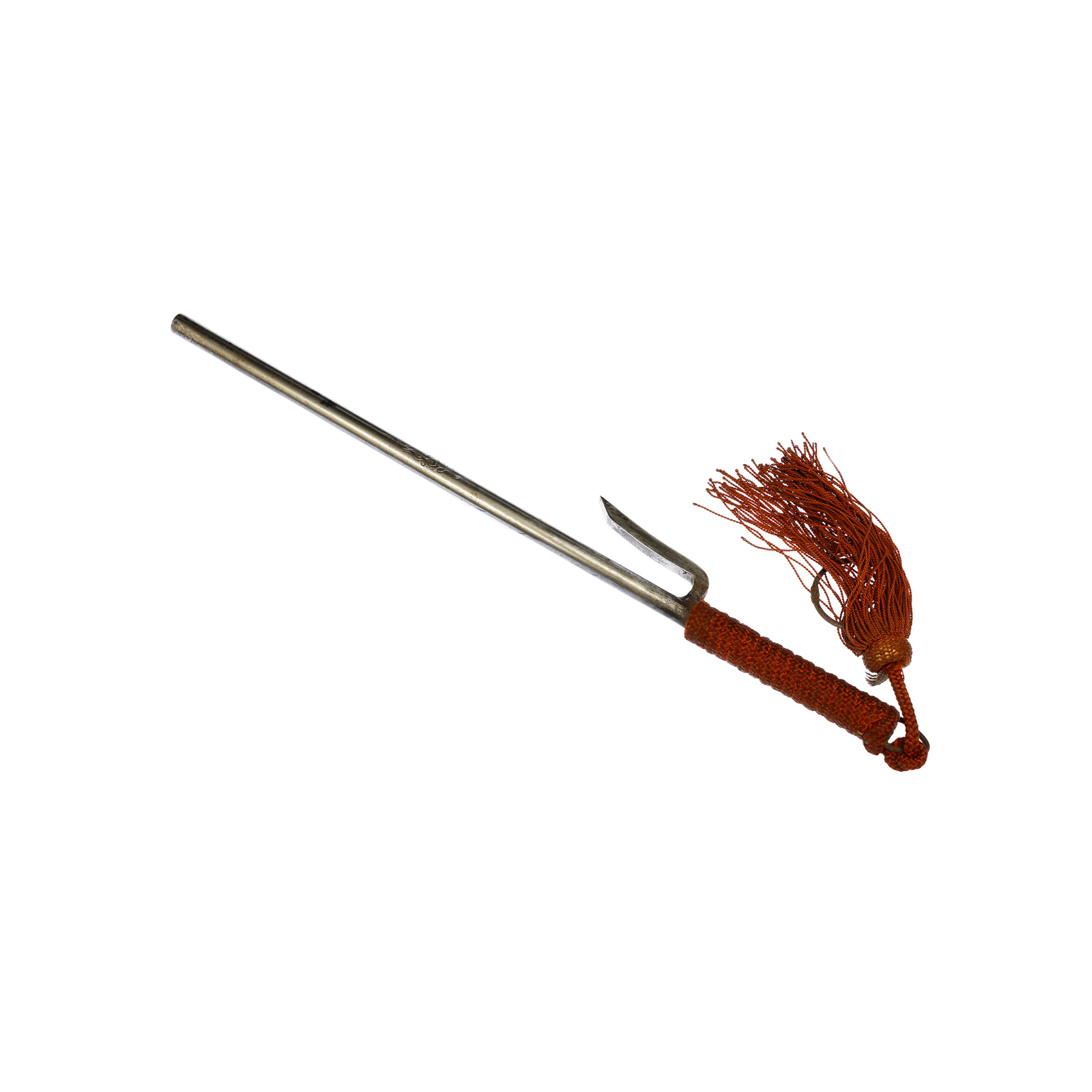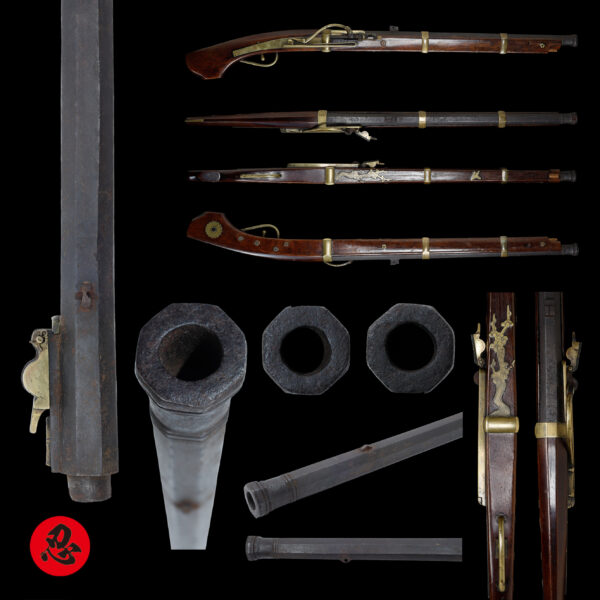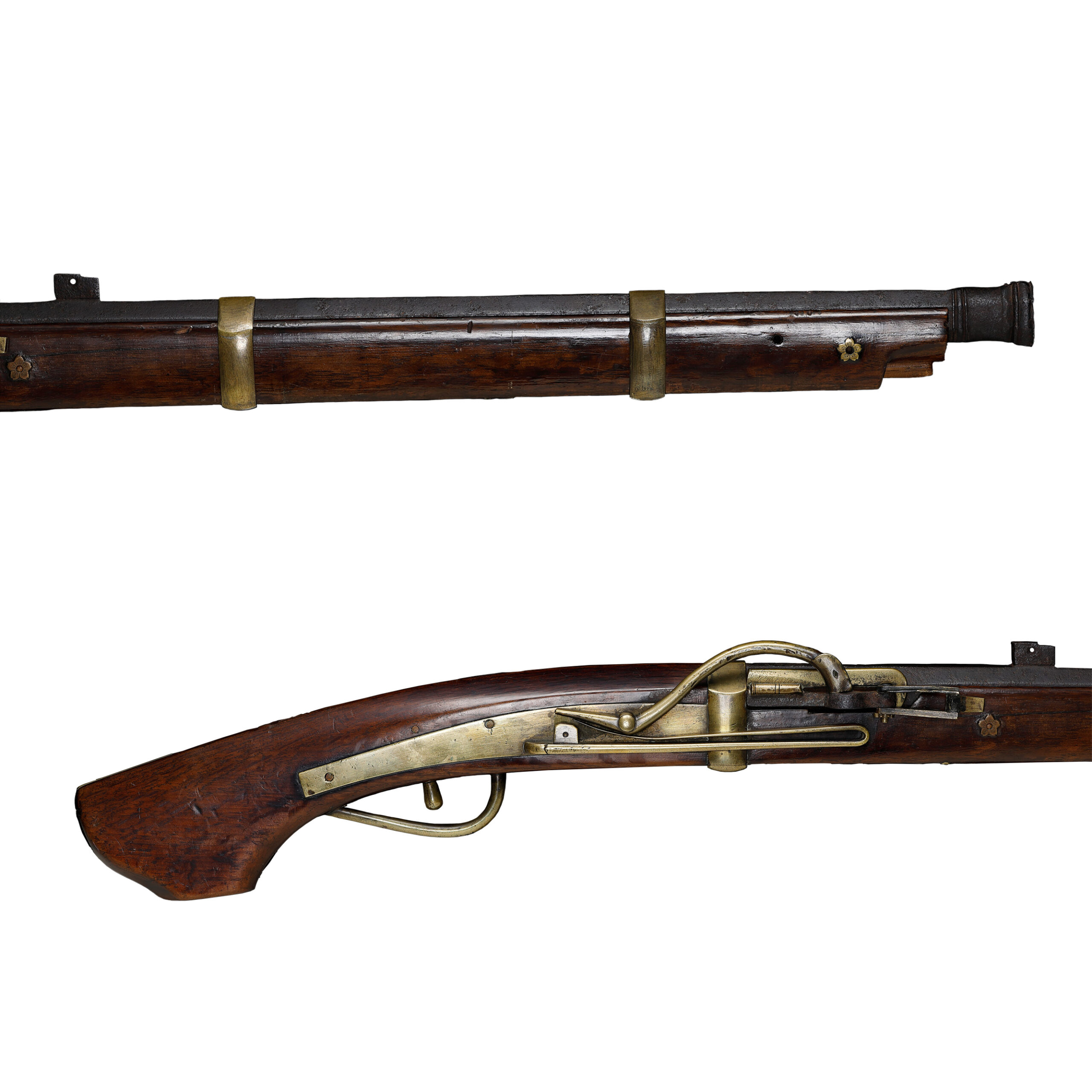Antique Japanese Matchlock Signed by Enamiya Kanzaemon Shigeyasu
【Description】
Summary
This matchlock has a relatively simple appearance. Its barrel is thicker than Kodutsu (小筒), the most common slender matchlock. This type of matchlock is called the Nakazutsu (中筒). According to a theory, it was challenging to handle Nakazutsu on the battlefields because the impact was strong when fired compared to Kozutsu. Due to their high price, Nakazutsu were not distributed in large numbers to temporary soldiers but were used by trained soldiers who continued to serve their masters.
The decorative parts of this matchlock are metal fittings of Mekugiana (目釘穴, a hole through which a nail is inserted to fix the barrel position). You would find Sakura (桜, cherry blossom) petals are deigned around each Mekugiana. This flower is one of the most well-known plants in Japan. Cherry blossoms tell us the arrival of spring, and they have been cherished for a long time. Their ephemerality, which disappears quickly after blooming, resonates with people’s emotions. In addition, there is a family crest on the barrel. We would mention it later, so please enjoy the description below.
Broadly speaking, there are two types of matchlock guns: those that are specialized for practical use on the battlefields and those that are more decorative and have a gorgeous appearance. The purpose of the former is clear, but the purpose of the latter is thought to have been to show off power. We estimate that decorative matchlocks were used as a symbol of authority as decoration rather than in actual combat.
We hope you enjoy the beauty of this relic of the Samurai era with this trivia about designs.
*Please keep in mind that there is no certificate for this matchlock. In addition, all the matchlocks we deal with are for the purpose of appreciation, and we do not guarantee their practicality. We do not assume actions such as loading gunpowder or bullets, disassembling, and firing. Even if an incident or accident occurs due to you modifying the product for purposes other than viewing, we will not take any responsibility. Thank you for your understanding.
【The brief history of matchlocks in Japan】
The introduction of matchlock
It is said that the Hinawa-Ju (火縄銃, matchlock) was introduced in Japan in 1543. A foreign merchant ship drifted ashore in Tanegashima (種子島), located in Kagoshima prefecture, and two Portuguese merchants on board carried two matchlocks. Tanegashima Tokitaka (種子島 時尭, 1528-1579), who was the lord of Tanegashima at that time, treated them with respect and bought these matchlock guns at a high price. One of the matchlock guns he had purchased was lent to a swordsmith in Tanegashima and ordered to be duplicated. It is said that matchlock guns spread throughout Japan through this process.
Appearance of matchlocks on battlefields
This is how matchlock guns were brought to Japan. And this weapon was first brought into actual combat in Japan at the Battle of Kurokawasaki in 1549 in Satsuma (薩摩, today’s Kagoshima prefecture). However, guns did not become the main weapon immediately after their introduction. To tell the truth, weapons such as spears, bows, and arrows were still the primary weapons at that time, and it is said that guns played an auxiliary role in intimidating the enemy’s horses with the sound of firing. According to historical facts, matchlock guns were used as the primary weapon at the Battle of Nagashino in 1575.
Success of matchlocks
Swords, spears, bows and arrows require training and combat experience. On the other hand, a matchlock was an easy weapon to learn and handle, even for those with no combat experience. Therefore, as matchlock guns became more mass-produced, the number of tactics in which Ashigaru (足軽, hired soldiers who were not Samurai, the main force in the Warring States period) were given to fight with matchlocks increased. Of course, not only Ashigarus but also gun units made up of Samurai were organized and played an active role on battlefields. It makes sense that matchlocks, which even beginners could aim for a certain amount of speed and accuracy, have spread battlefields.
Variety of matchlocks
Craftsmen who mastered replication techniques developed various forms of matchlocks, imagining all kinds of battlefields. A standard matchlock gun is about 130 cm long. There were also the Samazutsu (狭間筒), which were designed for battles on ships and in castles, the Bajouzutsu (馬上筒), which were for close-quarters combat and could be fired with one hand while riding a horse. There was also the Tanzutsu (短筒), a self-defense short cylinder that you could hide in your pocket, and the Ohdeppou (大鉄砲), a powerful cannon. In addition, various types of matchlocks were produced depending on the school and region, and most of them were handmade, so there is no interchangeability of parts.
The largest gun possession country in the world
According to a theory, the number of guns possessed by Japan during the Warring States period reached 500,000, which was an incredible number in the world. Tanegashima Tokitaka, mentioned above, gifted the matchlock (which was a different one from the one he lent to the swordsmith) to the lord of the Satsuma Domain with a matchlock gun. It is said that the lord of the Satsuma domain presented it to the 12th Shogun of the Muromachi shogunate, Ashikaga Yoshiharu (足利 義晴, 1511-1550). And then Yoshiharu lent it to a swordsmith in Ohmi Kunitomo (近江国友, today’s Nagahama city, Shiga prefecture) and ordered him to reproduce it. At last, a local swordsmith succeeded in duplicating two swords in about half a year. In this way, the domestic production of matchlock guns was achieved in a relatively short period of time in multiple areas. It is amazing the high level of skill of the swordsmiths back then. This was probably due to the excellent iron-making and casting techniques obtained from the production of Japanese swords. However, in the Edo period, Japan welcomed a time of peace, and the demand for guns decreased. Finally, people stopped the improvements of matchlock guns.
Full length: 107.9 cm (42.5 inches)
Barrel length: 69.7 cm (27.4 inches)
Caliber: 1.8 cm (0.7 inches)
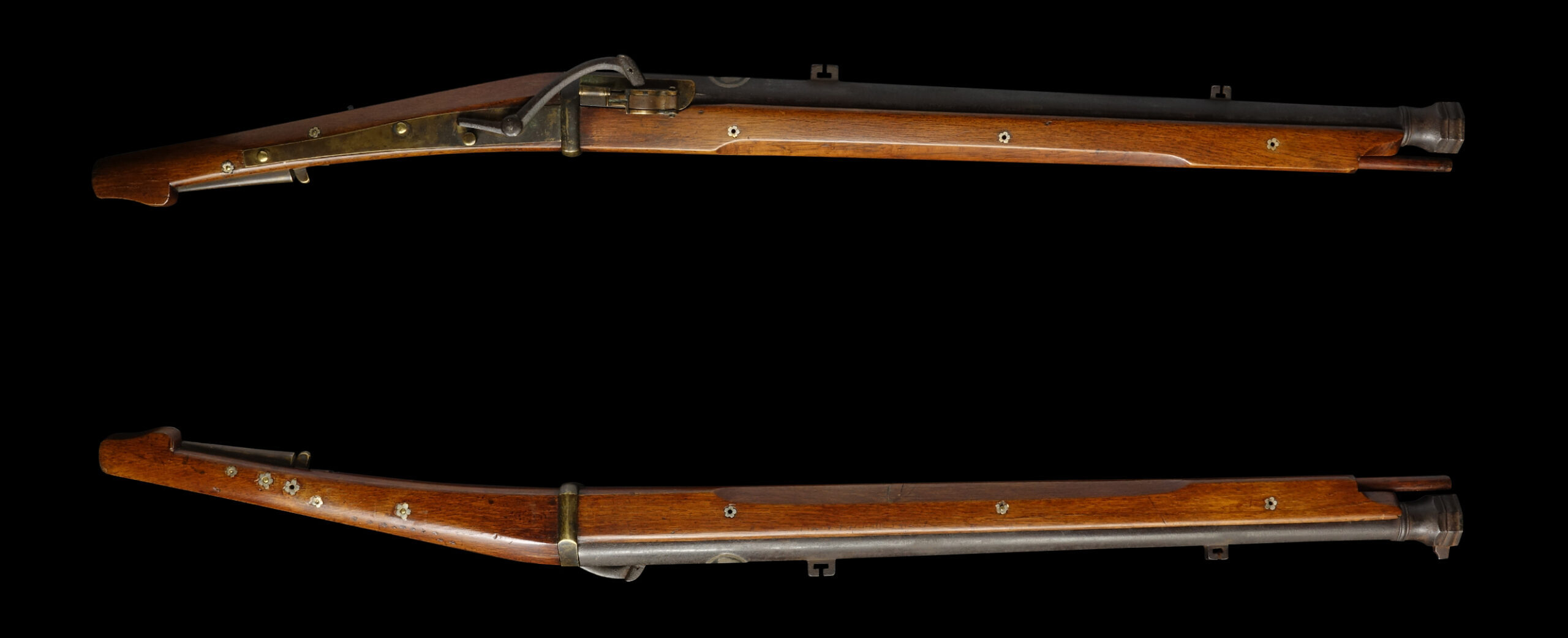
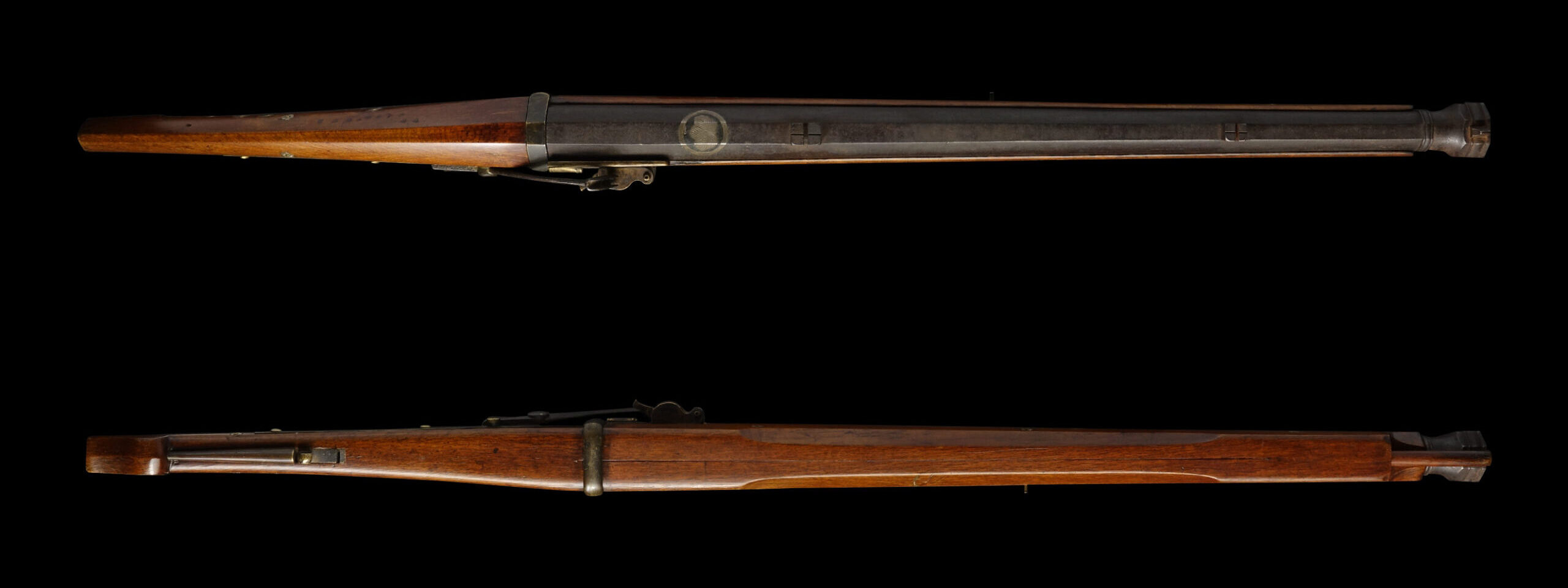
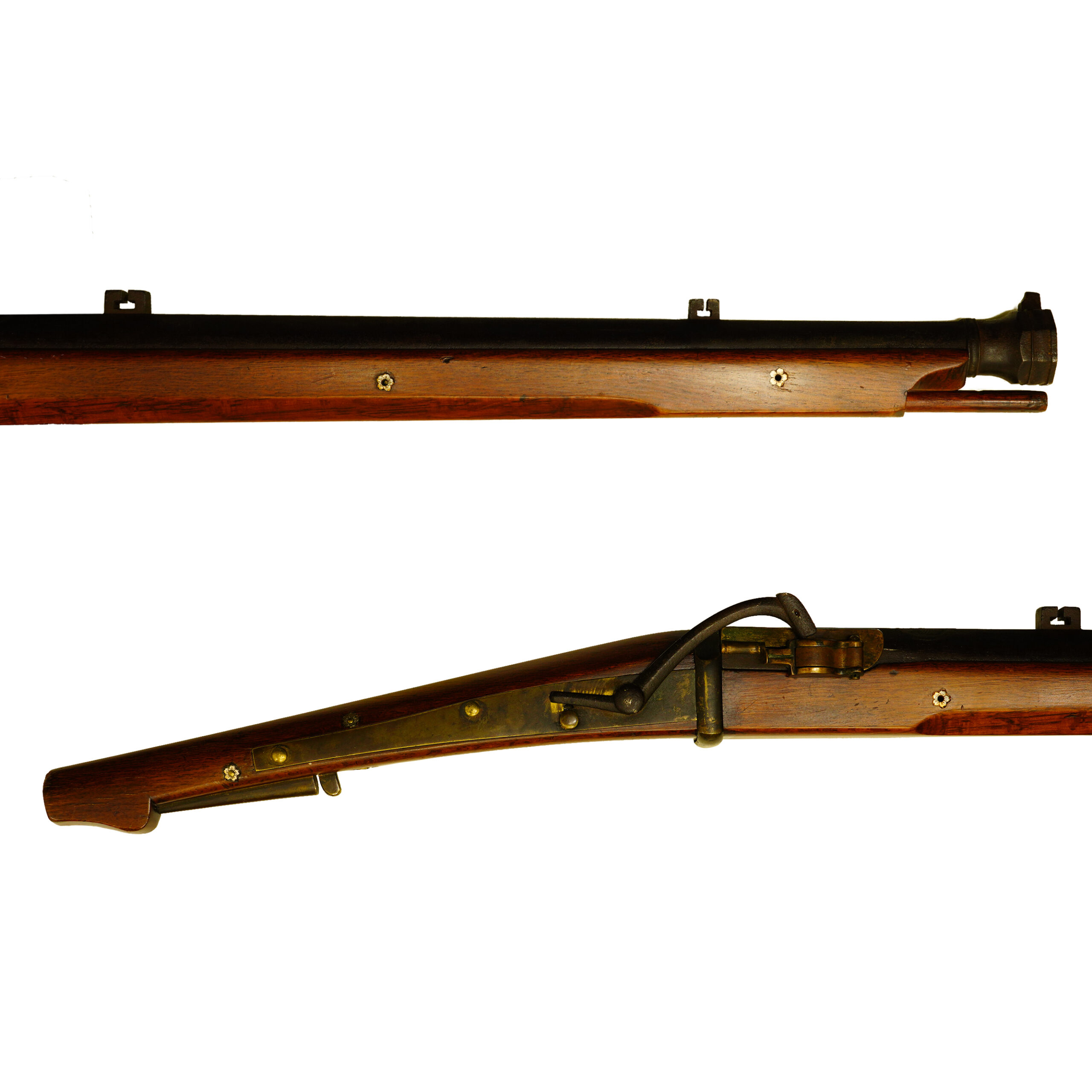
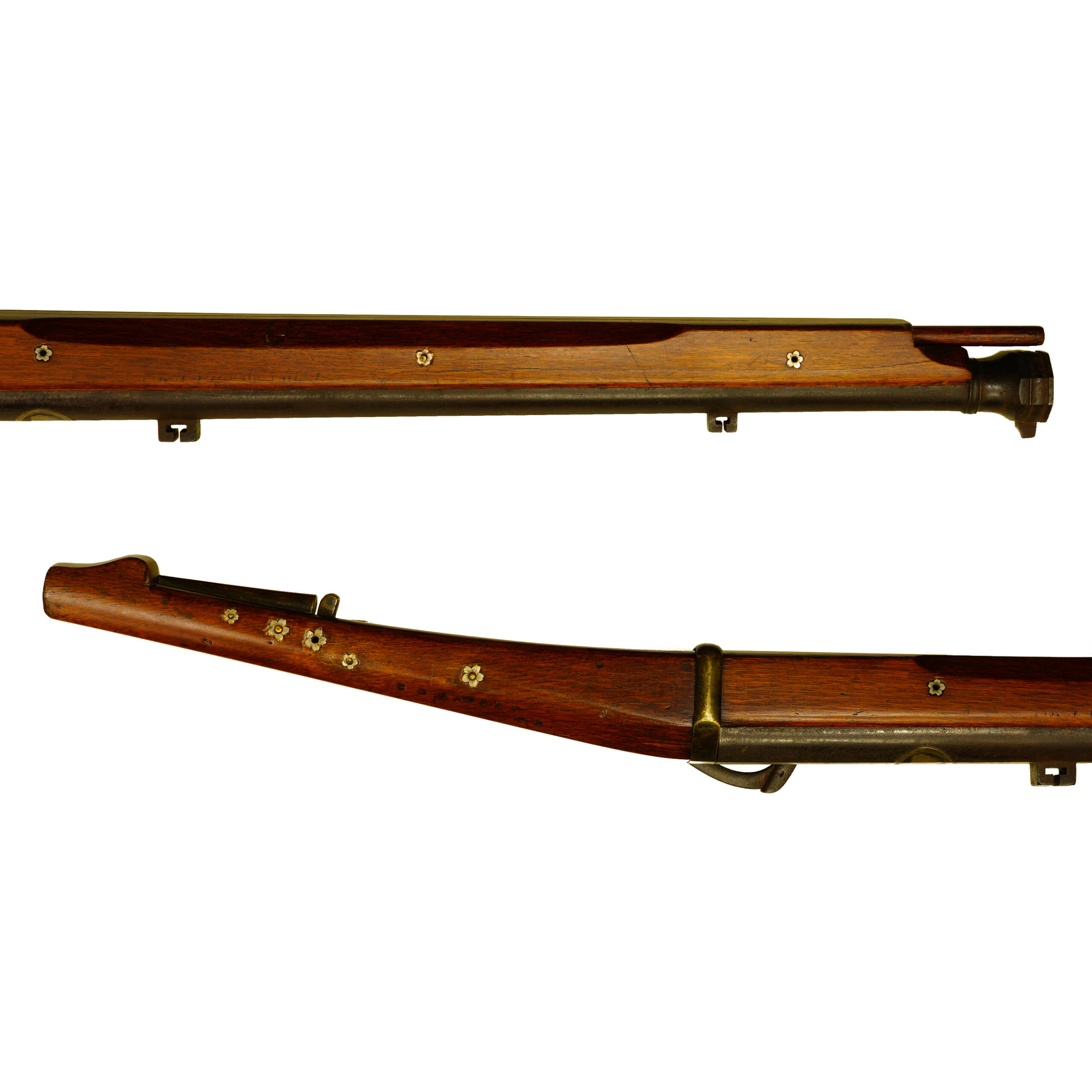
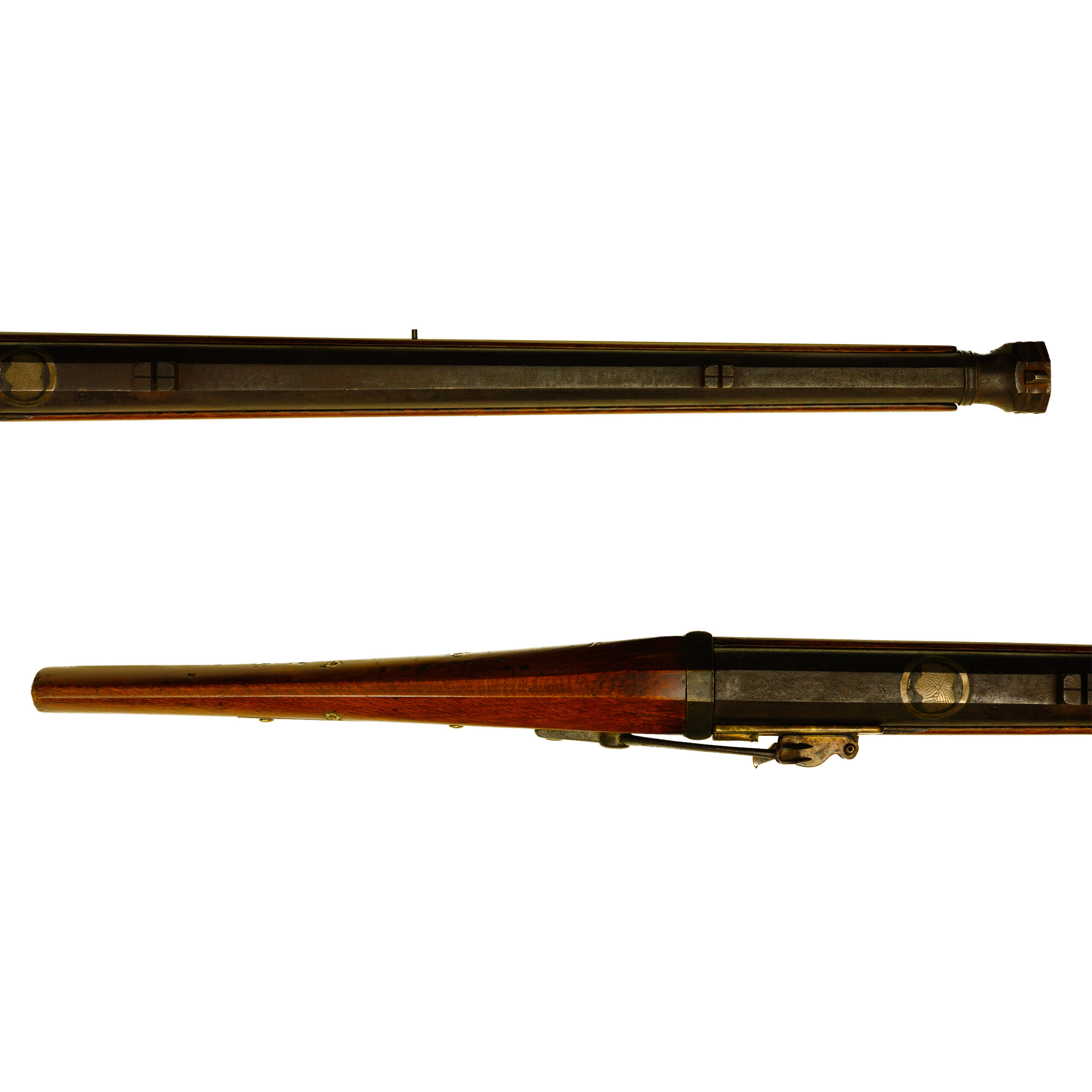
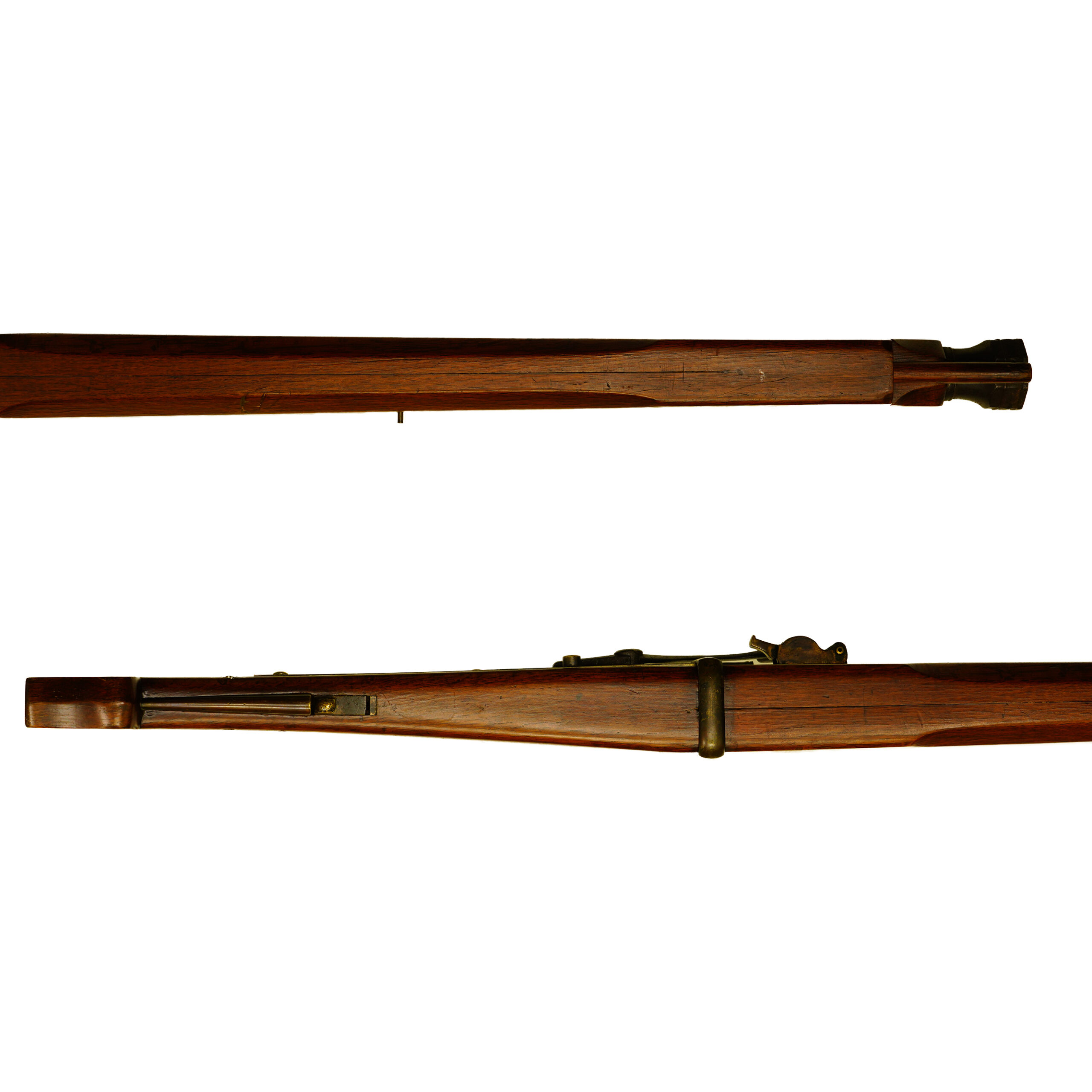
Mei (銘, engraved inscription)
There is an engraved inscription on the barrel. It is written as 榎並勘左衛門重恭 (Enami Kanzamon Shigeyasu). It shows the name of this matchlock’s maker. In addition, we could also find the year of manufacture of this matchlock gun is also engraved. It is written 嘉永七甲寅年 (Kaei Nana Kinoetora Doshi, 1854). Please note that NO provenance or certificate proves its signature’s authenticity.
While there is no proof, we would like to present one possibility here. The Enamiya Kanzaemon (榎並屋勘左衛門) family was an essential gunsmith for the Edo Shogunate, and together with the Shibatsuji Riemon (芝辻理右衛門) family, they held a central position as gunsmiths in Sakai (堺, today’s Sakai city, Osaka prefecture). The Gokaji (五鍛冶, the five blacksmiths, later the two blacksmiths dropped out and the three blacksmiths) were called the Hira Kaji (平鍛冶), including the branch families of these two families, Enonamiya Kyubei (榎並屋九兵衛/次右衛門, Jiemon), Enonamiya Kanshichi (榎並屋勘七/忠兵衛, Chubei), and Shibatsuji Chozaemon (芝辻長左衛門), and they controlled other gunsmiths.


Kamon (家紋, family crest)
You would find a circled mark is depicted on the barrel. We believe this is a type of the Kiri (桐, paulownia) designed family crest. No flowers are depicted here, and the design consists only of leaves. The Kiri pattern is generally composed of three standing straight inflorescences and three leaves. The number of blooming flowers at each inflorescence means the ranks of this design. The imperial family and national leaders of the time once used this plant pattern. Today, this plant pattern is used as the crest of the Japanese Government.

Jukou (銃口, the muzzle of a gun)

Registration Number: Tokyo 319026
The Board of Education in Tokyo prefecture issued a registration paper for this matchlock. It is called Ju Hou Tohken Rui Tourokusho (銃砲刀剣類登録証). Bunkachou (The Agency for Cultural Affairs) acknowledges a Japanese matchlock with this paper as a work of art.
The appraisal of old-fashioned firearms, such as matchlock firearms, is based on the following: Japanese-made guns were manufactured before the third year of Keio (1867), and foreign-made firearms were introduced to Japan before the same year. It shall be determined whether or not it falls under any of the items of
1. Matchlock-type, flint-type, tube-type, paper-wrapped-type, or pin-type (crab-eye) guns whose beauty is recognized in terms of shape, inlay, carving, etcetera, or those with value as materials.
2. Firearms equivalent to those listed in the previous item that are valuable as antiques (excluding those that can be used with ammunition that has been in practical use since the 19th year of the Meiji period).
This paper will need to be returned to the board of education when the matchlock is being shipped abroad, but you can receive a copy of it. An English translation of this registration paper is available on request.
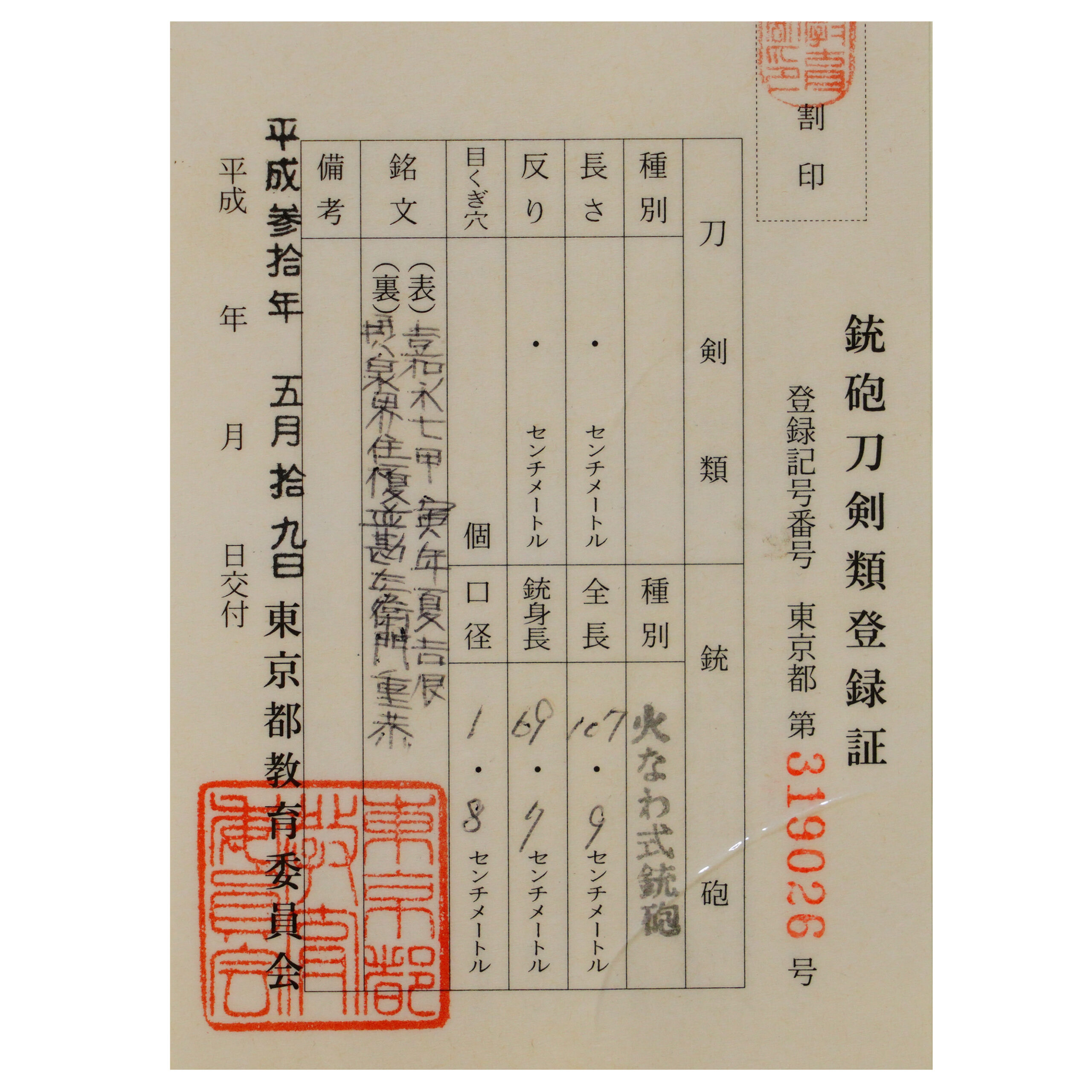
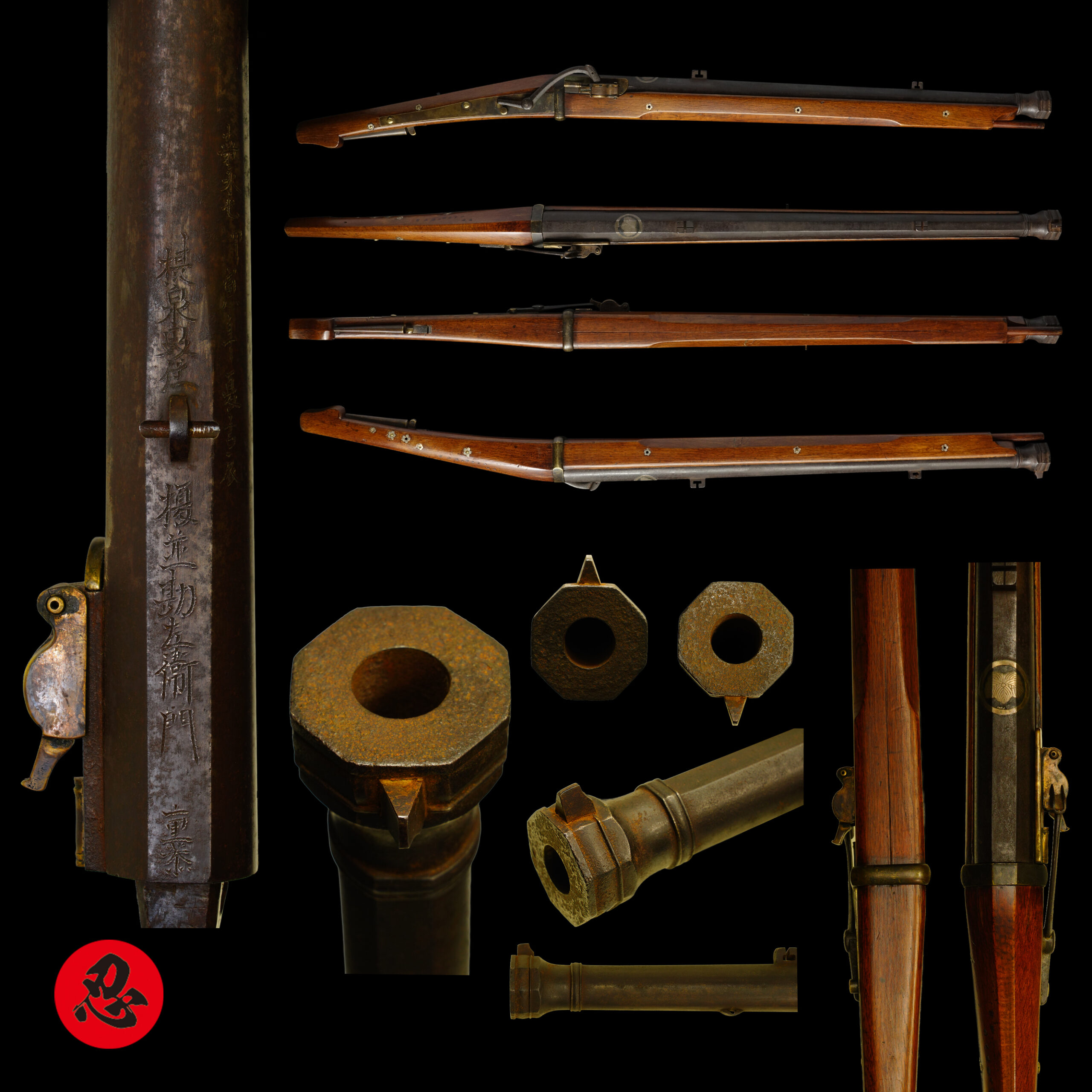
【About us】
Ninja Weapon Museum is located in Kanazawa, Japan, exhibiting antique artifacts related to the history of Ninja and Samurai.
【Caution】
All the matchlocks we deal with are for the purpose of appreciation, and we do not guarantee their practicality or functionality. We do not assume actions such as loading gunpowder or bullets, disassembling, and firing. Even if an incident or accident occurs due to you modifying the product for purposes other than viewing, we will not take any responsibility. Please also make sure that you are allowed to import an antique Japanese matchlock. Thank you for your understanding.
【Japanese Matchlock & Export Process】
The Japanese matchlocks we deal with are made in Japan during the Edo period. Each Japanese matchlock is registered under the Agency for Cultural Affairs and the Board of Education in Japan. They issue a registration paper for each Japanese matchlock for its owner in Japan to legally possess it. The Japanese matchlock with its registration paper means it was traditionally hand-forged in Japan.
To legally export the matchlock from Japan to other countries, we will have to apply for its permit to the Agency for Cultural Affairs (Bunkacho) and return the original registration paper to the Board of Education. It normally takes around 2-4 weeks to receive this permit after submitting required documents. And we would like you to expect at least 1-1.5 months for your order to arrive at your given address after you ordered.
【Payment method】
We accept payment through Stripe (Credit card), Apple Pay, or ChromePay, all of which are secure payment methods. If you prefer other payment methods, please contact us. You may either pay in JPY, USD. The price is set in Japanese Yen. Prices in other currencies are automatically calculated based on the latest exchange rate.

【Shipping duration】
We can only ship this antique matchlock to the USA. If you don’t live in the USA and like to order, please contact us first before making a purchase. We offer Free International Shipping as long as we can send antique matchlocks by EMS.
We normally ship by EMS (Express Mail Service) provided by Japan Post. We will send you a tracking number for your order as soon as we hand it to the post office. We will put 100 % insurance on the shipping document without any extra charge. Based on the total amount, there might be a duty tax or other fee for you to pay, depending on the countries. We use package cushioning to protect the item and put it in a PVC pipe, which is one of the most secure packages because of its durability.
It will normally take 5-14 days for the item to arrive at your given address after we dispatch it. Time of delivery is estimated as accurately as possible by the carrier but does not take into account any delays beyond our control such as by inclement weather, post office holiday seasons.
*Please keep in mind that due to the spread of COVID-19, there might be delays in shipping. If you like to know the detail about shipping, please feel free to ask us.

【How To Contact Us】
Please contact us through email, Facebook Messenger if you have any questions. You can find each icon on the right side of the website. Please click one of them to reach us. We will reply to you within 1-2 business days.



